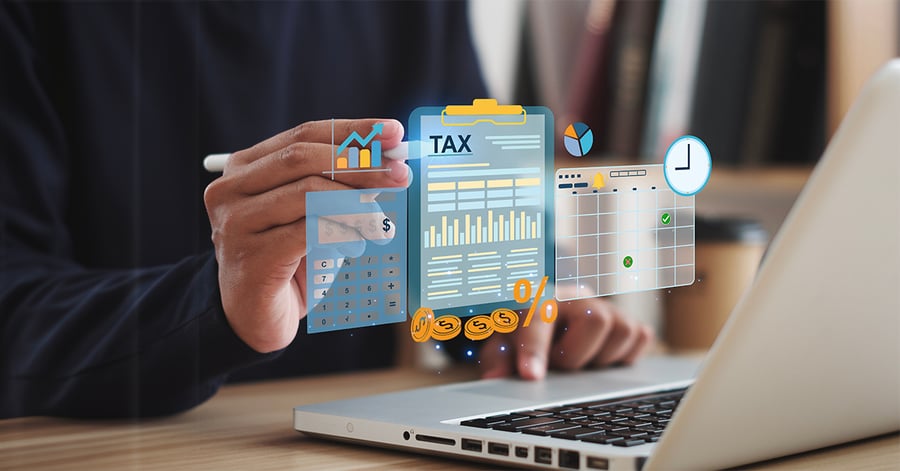
- Home
- Global Payroll
- Finance (No.2) Act 2024: Impact on Your Paycheck & Tax Returns
Finance (No.2) Act 2024: Impact on Your Paycheck & Tax Returns
Published :

The Hon’ble Finance Minister presented the Union Budget for the Financial Year (FY) 2024-25 (Assessment Year AY 2025-26) on July 23, 2024 and it got Presidential assent on August 16, 2024, without any change to the proposals made in July impacting payroll.
Most of these changes favour the employees who have opted for the New Tax Regime u/s 115BAC(1A). So, let’s take a quick recap of what Budget 2024-25 has brought for private sector employees and how it is handled in Ramco Payroll.
A. Better Tax Rates under New Tax Regime
|
Total income |
Rate of tax |
|
|
FY 2023-24 |
FY 2024-25 |
|
|
Upto ₹ 3,00,000 |
Upto ₹ 3,00,000 |
Nil |
|
From ₹ 3,00,001 to ₹ 6,00,000 |
From ₹ 3,00,001 to ₹ 7,00,000 |
5 % |
|
From ₹ 6,00,001 to ₹ 9,00,000 |
From ₹ 7,00,001 to ₹ 10,00,000 |
10 % |
|
From ₹ 9,00,001 to ₹ 12,00,000 |
From ₹ 10,00,001 to ₹ 12,00,000 |
15 % |
|
From ₹ 12,00,001 to ₹ 15,00,000 |
From ₹ 12,00,001 to ₹ 15,00,000 |
20 % |
|
Above ₹ 15,00,000 |
Above ₹ 15,00,000 |
30 % |
This means an annual tax savings up to ₹5,000 for an employee with taxable income more than ₹6,00,000 but less than ₹9,00,000. For an employee with annual taxable income more than ₹9,00,000, this would mean a total tax savings up to ₹10,000.
B. Higher Standard Deduction for Taxpayers under New Tax Regime
Standard deduction for employees opting for New Tax Regime has increased from ₹50,000 to ₹75,000 for the FY 2024-25. This means your total taxable salary income will now get reduced by ₹75,000 (instead of ₹50,000) to calculate your annual taxable income. However, the standard deduction remains at ₹50,000 for employees who have opted OUT of the New Tax Regime u/s 115BAC(6) (simply, who have selected Old Tax Regime).
C. Higher employer contribution to Pension Scheme and Deduction for it u/s 80CCD(2)
Now, employers can claim their contribution to a pension scheme specified u/s 80CCD(2), viz. National Pension Scheme (NPS) and Atal Pension Yojana (APY), up to 14% of your salary as deductible expenditure. And the employees opting for New Tax Regime can also claim deduction for the same u/s 80CCD(2) up to 14% of their salary. Earlier, this limit was 10% of salary. It’s a win-win for both employers and employees!
However, it is important to reiterate here that if you have opted for Old Tax Regime, you can claim deduction u/s 80CCD(2) towards your employer’s contribution only up to 10% of your salary. (Not much of a win for employees here!)
Employee Declaration on Ramco Payroll
You can navigate as under to declare the deduction u/s 80CCD(2):
ESS > Indian Taxes > Record Tax Declaration/Proof Submission > Deductions under Chapter VI A
Or, if it is handled through Ramco’s Compensation Module, employer’s contribution % can be increased from 10% to 14% and it will be automatically considered as taxable income first and then, as deduction u/s 80CCD(2) depending on the tax regime selected by you.
D. Deduction for donations made to National Sports Development Fund
The existing provisions of Section 80G (Deduction for Donations) provide for deduction from total taxable income of an individual any sums paid as donations to the “National Sports Fund to be set” up by the Central Government. As the Government had already set up the aforesaid fund by the name of “National Sports Development Fund”, deduction u/s 80G will now be available for donations made to “National Sports Development Fund” instead of “National Sports Fund”.
Employee Declaration on Ramco Payroll
You can navigate as under to declare the deduction u/s 80G:
ESS > Indian Taxes > Record Tax Declaration/Proof Submission > Deductions under Chapter VI A > 80G- National Sports Development Fund
E. Ease in claiming credit for TCS collected/TDS deducted
Section 192 of the Income Tax Act requires employers to consider income other than salary also, as declared by you, so as to calculate appropriate TDS that can be deducted from salary which can reduce excess tax liability for you at the time of annual return filing. To further ease tax filing and resolve cash flow issues, from October 2024, you can also declare the TDS or TCS paid by you to claim its credit. This will reduce your monthly TDS from salary and increase your take home salary, instead of claiming the same as refund at the time of return filing.
However, please ensure that against TDS claimed, you also declare the relevant income, otherwise it can increase tax payable at the time of return filing and may attract interest and penalty as well.
Employee Declaration on Ramco Payroll
You can navigate as under to declare TDS/TCS paid:
ESS > Indian Taxes > Record Tax Declaration/Proof Submission > Review & Confirm > Other Declaration
To declare other income details, you can use below navigation:
ESS > Indian Taxes > Record Tax Declaration/Proof Submission > Other Income Details
After reading all this, your curious mind may have many questions. Let’s try to address some of them here.
What difference does it make if my payroll system is considering budget changes from September payroll instead of August 2024?
All the above-mentioned changes are applicable from April 2024, except consideration of TDS/TCS paid by you which will be applicable from October 2024. As monthly TDS from salary is calculated considering your annual taxable income and annual tax rates, TDS from September 2024 payroll and onwards will get auto-adjusted considering the tax regime you have opted, eligible exemptions, deductions, revised tax rates and monthly TDS already deducted from your salaries paid in the previous five months (April-August 2024).
How will this impact my take home salary from the month of September 2024 and onwards?
For employees who have opted for Old Tax Regime, the tax liability may not get impacted much. If you have paid TDS/TCS, you can claim the same from October 2024 and onwards to reduce your monthly TDS payable. For employees who have opted for New Tax Regime, additionally, they will benefit from better tax rates, higher standard deduction and higher deduction u/s 80CCD(2) if their employer increases its contribution to NPS/APY from 10% to 14% of salary.
Should I now switch to the New Tax Regime?
Depends! It depends on your salary structure and types of benefits received like house rent allowance, leave travel allowance, children education allowance etc. which are subject to tax exemptions, to some extent. It also depends on the kind of expenditure you are making like medical insurance premium, life insurance premium, prepayment of housing loan, life insurance premium etc., kind of investments you are making like in eligible mutual funds, National Pension Scheme, Atal Pension Yojana, Sukanya Samridhi etc. and related other factors for which you can claim deductions under Chapter VI-A of Income Tax Act, as some exemptions and deductions are only available under the Old Tax Regime.
To figure out which regime works better for you, you can use this calculator given by the Income Tax Department.
What if I now want to switch from Old Regime to New Regime?
Considering the favourable changes made under New Tax Regime, many employees would now be deliberating on switching to default New Tax Regime from Old Regime, or may have already decided to do so! However, considering the administrative efforts involved at employer’s end, Circular no. 4/2023 was issued by the Income Tax Department on April 05, 2023 to guide employers that they can take declaration from their employees about their choice of regime for the purpose of TDS from salary u/s 192. It was also provided that if an employee wants to change the option later, he/she can do so at the time of filing annual Income Tax Return (ITR).
So, it’s up to the employer now whether it re-opens the window for tax regime selection or not. If not, don’t worry! You can still switch back to New Tax Regime at the time of ITR filing for the AY 2025-26 which will be due by July 31, 2025.
If you still have further questions, please reach out to your dedicated contact person from Ramco and we’ll get back to you at the earliest opportunity.
To stay up to date with all the payroll related legislative updates in India, please visit and subscribe to Ramco Payroll Compliance Portal.
Enterprise asset management (EAM) involves the management of mission critical assets of an organization throughout each asset's lifecycle. EAM is used to plan, optimize, execute, and track the needed maintenance activities with the associated priorities, skills, materials, tools, and information. The aim is to optimize the quality and utilization of assets throughout their lifecycle, increase productive uptime and reduce operational costs.
Enterprise asset management (EAM) involves the management of the maintenance of physical assets of an organization throughout each asset's lifecycle. EAM is used to plan, optimize, execute, and track the needed maintenance activities with the associated priorities, skills, materials, tools, and information.
The software helps in effective maintenance of assets through preventive, predictive, shutdown and breakdown maintenance strategies. The system also helps enterprises mitigate equipment risks by enhanced safety standards. The streamlined operations and improved asset performance helps organizations increase their investment effectiveness.
EAM is important because it helps organizations track, assess, manage and optimize asset quality and reliability. Asset intensive Organizations have hundreds, thousands, even millions of assets which needs to be maintained to maximize / optimize life of these assets to increase the return on investment.
The key features of effective EAM are:
Asset Intensive companies under the following Industries :
Contact us for a meeting and schedule a demo
This differs on case to case basis, based on the type of installation and unique industry specific requirements. Contact us for a meeting and schedule a demo.
This differs on case to case basis, based on the type of installation and unique industry specific requirements. Contact us for a meeting and schedule a demo.
Stay Connected, follow us on LinkedIn / Twitter to know more about EAM Software latest trends.

Enaakshi works at Ramco Systems as a Lead in the Payroll Bureau, which maintains tax and social security compliance on the Ramco platform for 50+ countries across Asia, Oceania, Africa, the Middle East, and Europe. Her key responsibilities include managing payroll tax and social security compliance and ensuring they are kept up to date on the platform. She is a qualified Chartered Accountant and holds a Diploma in International Taxation from the Institute of Chartered Accountants of India.
She has over 7 years of experience in global payroll compliance. In her leisure time, she enjoys quality time with her children, exploring new places, and enjoying delightful treats.

All Rights Reserved. © Copyright 2024. Ramco Systems.